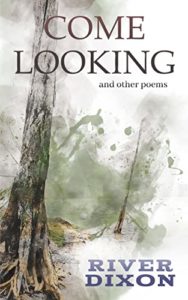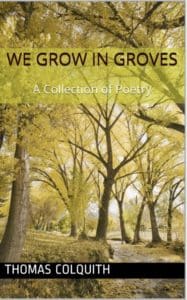River Dixon and Thomas Colquith Explore Regret, Loss, and Life
New collections by two very different poets, River Dixon and Thomas Colquith, deal with a number of subjects and ideas, but I found myself pairing them in how they explore the similar and related themes of regret and loss. To be sure, they deal with different types of regret and loss, and they deal with them in very different ways — Dixon with a what-might-have-been approach and Colquith with a more hopeful understanding. But both express a depth of feeling, and sometimes raw emotion and pain, that are gripping and almost riveting.
The differences between the two poets are obvious. Dixon writes in free verse; Colquith is more formalist but employs free verse as well. Dixon’s poems tend to be shorter and almost journalistic, pared down to essentials. Colquith’s poems also tell stories but add more description and detail. Dixon often forgoes punctuation; Colquith does not. Dixon sometimes writes poems in all lower-case; Colquith is more conventional with capitalization.
The similarities between the two are in the themes and the emotions their poems evoke.
Dixon’s Come Looking: and other poems contains 66 poems that ask questions common to midlife — an awareness of a life half over, the wondering if one is accomplishing all of what one hoped for in youth, and the growing awareness of mortality. They also describe living in a world that seems to have lost its mind as we look for “The next excuse / To feed, to justify / Our conditioned outrage / Full victimhood / On display,” as he writes in “Feeding Time.” These poems offer a fundamental questioning of not only the world in which we live but also how we live our lives within that world.
Sacrifice

On a fleeting
Expanse of stillness
Caress the waves
Over my lassitude
As I embrace
The reticence within
Spreading forth
From open vein
Coloring the world
Appeasing the nature
Of chaos that ruminates
Through these halls
As I lose myself to
The validation that
I once had a life worth giving
Dixon is a poet and fiction author. In addition to the poetry collections Left Waiting: And Other Poems and Lost in the Hours, he’s published Beyond the Field, a story for both children and adults; Colder: A Collection of Poetry and Prose; and The Stories in Between. He lives in the American Southwest, or, as he describes it, he “has unknowingly found himself trapped in the incessant heat and beauty of Arizona.”
The 48 poems of Colquith’s We Grow in Groves: A Collection of Poetry include several that deal with a physical disease. In “Dismal News,” Colquith writes of learning, when he was 22, that his father has been diagnosed with Huntington’s disease, only later realizing that he himself has a 50 percent chance of inheriting the same fate. The poems continue, addressing different subjects; life goes on, regardless of what may be diagnosed. But a story is being told here, and the reader senses that the personal diagnosis will not be good. And perhaps that is the idea behind the title — like trees, we grow in groves, similar yet different, sharing the good and the bad of our humanity.
Just a Thought

And recapture the vigor of our youth
With its hunger to uncover life’s mysteries,
Not yet saddled with a mature ennui.
To once more carelessly move through the world
Full of blissful ignorance and naïve indifference.
To unabashedly crawl through a pipe
Or carefully fly a kite.
To simply unleash a slinky or fling a yo-yo.
The child is always ready to play;
There’s never a dull day.
Why can’t we be the same way?
Is that youthful energy still within us;
Latent, underneath decades of cellulose and growth,
Somewhere within our core, at the middle of our rings?
Can it still be tapped into?
Can it still yield its playful syrup,
So saccharine and sweet?
Colquith has also published the poetry collection Let Our Memories Escape and the nonfiction book Hermetic Philosophy: Origins, Derivatives, and Impact. He received a B.S. degree in business from Indiana University and has worked in business, agriculture, and construction. He lives in Pennsylvania.
Both Come Looking by Dixon and We Grow in Groves by Colquith end not in hopelessness but in understanding. Dixon looks to stories, while Colquith looks to faith. Both find hope, even in the face of loss, regret, and illness.
Related:
Thomas Colquith and Let Our Memories Escape
River Dixon and Lost in the Hours
Photo by Harold Meerveld, Creative Commons, via Flickr. Post by Glynn Young.
How to Read a Poem uses images like the mouse, the hive, the switch (from the Billy Collins poem)—to guide readers into new ways of understanding poems. Anthology included.
“I require all our incoming poetry students—in the MFA I direct—to buy and read this book.”
—Jeanetta Calhoun Mish
- Poets and Poems: Michelle Ortega and “When You Ask Me, Why Paris?” - April 10, 2025
- Robert Waldron Imagines the Creation of “The Hound of Heaven” - April 8, 2025
- Poets and Poems: Luci Shaw and “An Incremental Life” - April 3, 2025


Leave a Reply